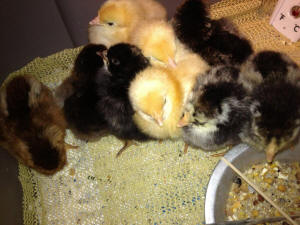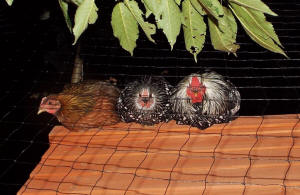|
 These are all indications that you might find
raising backyard chickens a valuable addition to your life.
Observing and caring for chickens has become a popular leisure
activity - and it comes with dividends. These are all indications that you might find
raising backyard chickens a valuable addition to your life.
Observing and caring for chickens has become a popular leisure
activity - and it comes with dividends.
However, before you set your heart on acquiring any of these
delightful creatures and making investments in supplies and shelter,
you will want to check with your local zoning office to see if
chickens are permitted where you live. There may be restrictions or
requirements - the number of hens or roosters, noise, odor,
structures, fencing.
Checking in with Lincoln's Building and Safety Office, Officer Wes
Woodhall was quick to respond that keeping chickens/poultry is not
permitted based on Lincoln City Code 6-2-32.
Not sure what it might be like to raise chickens in your backyard?
The following videos will give you a glimpse:
What aged chicks do you want to start?
Chickens have become popular in some small communities and rural
home settings as they take relatively little space, less expense
than other animals or birds; are easy to care for and can be lots of
fun.

Easy, cheap, fun - let's get started with urban
farm expert Naomi Montacre in
Raising
backyard chickens video as she provides some basics
such as what age chicken might be best to purchase to get you
started.
New hatchlings or teenager 'pullets' are most often available in the
spring.

If you love the idea of watching fuzzy newly hatched
chicks develop, be prepared to take a little extra time to monitor
your chicks health, temperature, food and water, and keep everything
clean a minimum of twice a day for several weeks. It is a labor of
love that has its rewards, but takes time.
If you do not have a lot of time, you can purchase pullets. Still
young, charming and impressionable, but more stable and less time to
care for, these birds will also give you a head start to when you
might expect to get eggs for your breakfast.
Either pullets or newly hatched chicks can be purchased from
hatcheries, farm supply outlets, or online. Depending on where you
order, chicks can be mail ordered for post office pick up or home
delivery, or may be picked up at hatcheries or farm supply
locations.

As a leisure activity, you likely want to select sociable, gentle
chicken breeds that are not aggressive with other chickens or
people. Breeds can be chosen for personality traits, as well as
size, color and appearances.
While every hen is said to have about 4,000 eggs, most chickens are
done laying after a few years. As chickens typically have a
life-span of six to 12 years, and you likely will want to keep your
non-laying girlfriends around past their prime, you may manage your
flock for eggs by adding a couple hens in future years.
Some chickens are considered better layers, laying more eggs per
week. There are also many colors and sizes of eggs. If you are
feeding a family, the size and number of eggs per week may be a
factor in your choices; also be aware, in central Illinois
production typically falls off during winter months.
No one claims that one egg is better tasting than another, though
what you feed a chicken could influence taste. They say that when
chickens eat asparagus the eggs pick up the flavor. You'll have to
test that for yourself. Choosing your
breeds
What kind of
chickens should you get? shows you a few selections of
breeds. In this
Picking
chickens video, Cochins are said to be the top choice as
pets. They are typically sweet and docile, quieter, and the roosters
are known to crow less. The hens lay fewer eggs per week. Orpingtons
are another favorite breed known for their gentleness. And the
little puff ball Silkies are a favorite of children for their size
and gentle nature. Where can you buy a
chicken?
My Pet Chicken offers products and chickens. The company acts like a
brokerage and puts orders together from a range of sources and
hatcheries to give you what you want when you want it. The company
has a good reputation for customer satisfaction.
The My Pet Chicken offers a
"Pick a chicken!" Breed selector tool
Daily living with chickens
Below are a couple videos that will give you more of an idea of what
to expect in keeping chickens.
[to top of second column] |
 The owner of
Rivera urban
homestead gives five points on how chickens have become a
beneficial part of their family's daily living:
- The family of five has nearly no food waste,
chickens get meat, vegetable and fruit leftovers. While chickens
need to be fed a regular diet high in grains protein that is
formulated for chickens, they also enjoy treats of meats,
vegetables and fruits. It is quicker to list what is not good to
feed chickens - citrus, onion or avocado. One thing left out of
his no-no list, tomatoes and any raw green skins on potatoes are
toxic to chickens.
- Chickens love to eat bugs. So you have pest
control.
- Chicken droppings added to other organic
matter such as vegetable scrapes and leaves, make great compost,
beneficial for next year's garden production.
- Chickens provide unending entertainment with
their curious, playful personalities.
- And of course, you get plenty of healthy
organic eggs to eat.
Simple
sustainable living
Jaime at Guildbrook Farm takes you through her
average day of caring for chickens. When set up well, you will
see just how quick and easy it is to care for a few chickens.
The entertainment never ends with chickens, whether it is the
daily chase for a treat or a bug, or some other playful chicken
game, especially morning just after being let out into the fresh
air and a new day.

End of day rituals are just as pleasant. As the sun begins
setting, the chicks get in some last bug hunting and
socializing. Then as the street lights come on, so to speak,
there is always one gal in every flock who takes the
responsibility to round all the others up for bedtime. She'll
circle the other chickens and walk into the coop incessantly
uttering an elongated low croon, sending a clear message, "It's
time for bed girls, dark is coming," and repeat the pattern
until all are safely tucked away.

This coop has been
enclosed by a 100-foot solar powered electric fence like the one
in Jaime's video, which will keep out ground predators such as
coyotes and racoons that would destroy or eat chickens. The area
was also covered with bird netting clamped to the fencing with
plastic clamps. It provides ample foraging space for a small
flock of birds to free range while being protected from ground
and airborne predators.
The first two nights these three birds felt so safe in their new
setting they decided it was time for a sleep out under the
stars, on top of the coop. However, chickens don't think once
the lights go out, the lights really do go out inside their
heads. For their safety the birds were moved to the inside for
the night.
There is much more to learn as you go and
plenty of resources about raising chickens that can be found on
the Net or in books from your local library.
In a coupe of hours you learn most everything you'd need and
soon be sliding a coop door open saying, "Good morning
chickens!" as they tumble and fly out, and later in the day,
"Good night chickens."
-----
You will find chicken supplies at
most local farm supply outlets. Big R in Lincoln carries
feeders, waterers, feed, small coops and other supplies.

|